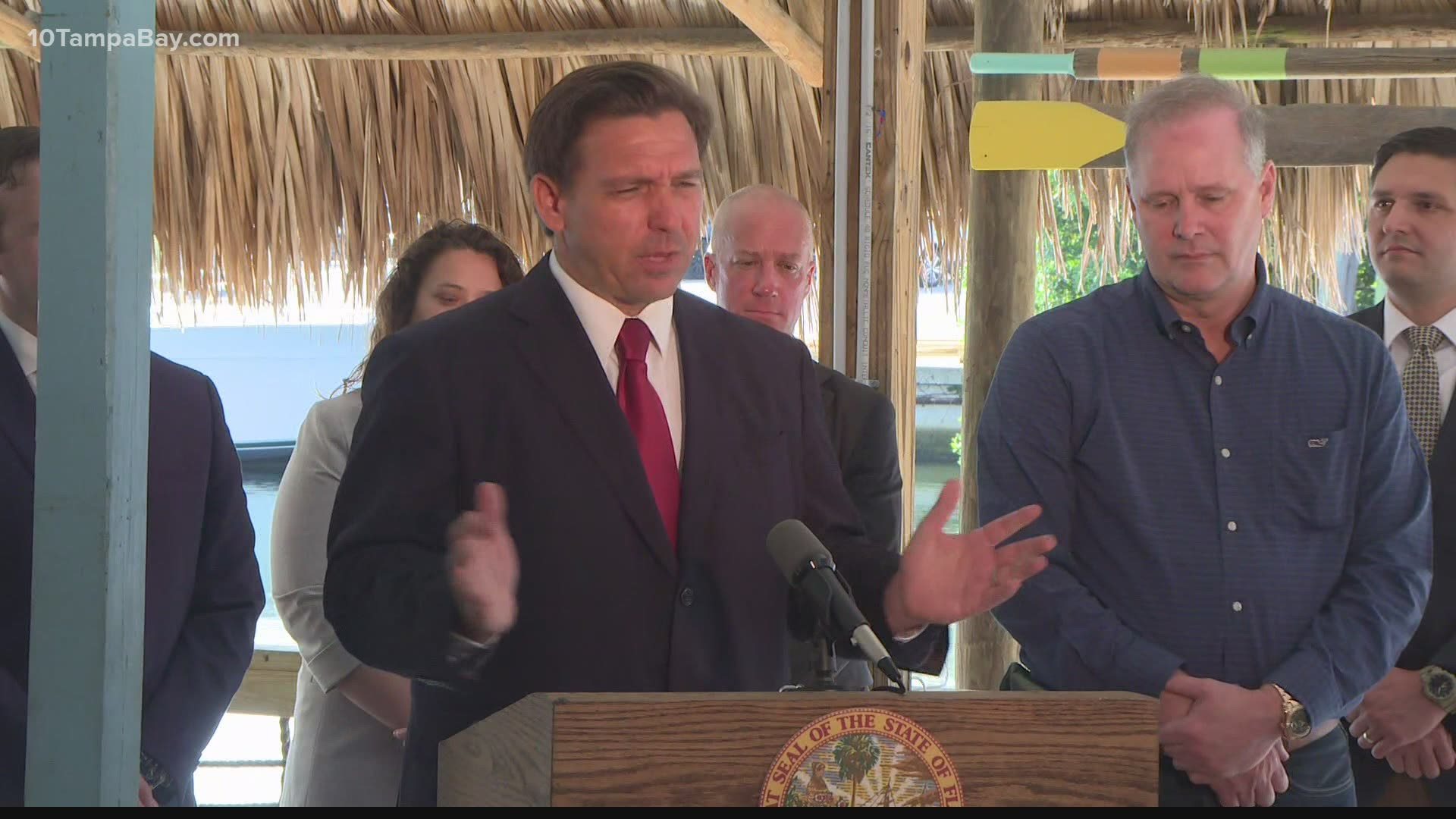ST. PETERSBURG, Fla. — Florida Gov. Ron DeSantis is continuing to push back against the ideas of lockdowns and restrictions during the pandemic by taking immediate action to suspend local emergency orders that were put in place earlier in the pandemic.
He also signed a new COVID bill and executive order that will take effect on July 1.
At the Big Catch at Salt Creek, a restaurant and bar in St. Petersburg, DeSantis and other Republican members of the Florida House and Senate held a media event regarding the emergency act that came out of the state’s pandemic committee.
The location was important as Big Catch at Salt Creek is a local business that had faced fines for violating a local emergency order.
The governor said his suspension of local COVID-related emergency orders, which are currently in place, through his executive power was "the evidence-based thing to do."
DeSantis cited the amount of Floridians vaccinated, the surplus of doses in the state and his want for people in the state to live freely as reasons behind the decision.
The governor added that emergency orders and "extraordinary measures" are not justifiable at this point.
“Given the fact that we have widespread availability of vaccines, that the vaccines are effective I think these emergency orders – the fact is we’re no longer in a state of emergency. All that we have to do to deal with COVID, and we’re not done with it, that does not need an emergency posture by local government to be able to do," DeSantis said.
"We’re gonna be able to handle it. People are gonna be able to make decisions and they have the wherewithal to be able to protect themselves with vaccine if they want," he said in closing.
The governor's decision has already received backlash from St. Petersburg Mayor Rick Kriseman, who has been a vocal critic of DeSantis.
"To be clear, cities like St. Pete, Tampa, Orlando, Miami and Miami Beach, saved Florida and the governor's behind throughout this pandemic. Can you imagine if each city had been led by Ron DeSantis? How many lives would have been lost? What would our economy look like today?" Kriseman wrote.
Kriseman held a press conference of his own Monday in response to the governor's announcement and the legislation.
"They're more interested in the powers of the legislature and the governor and in businesses and keeping them open than they are in the health and safety of our public," Kriseman said
Among the things the St. Pete mayor finds problematic are the breadth of the power the bill gives the governor, how he says decisions are rooted in politics instead of public safety and that it creates unclear next steps for local leaders.
Kriseman believes the bill will be challenged – but in the meantime is working with his legal department to see how the governor's action impacts local guidance.
"This act, this isn't for the protection of Floridians. This is for politics and that's not what it's supposed to be," the mayor added.
It's a sentiment Congressman Charlie Crist agrees with, saying that the governor is overstepping with the suspension of local emergency orders.
"Governor DeSantis's actions today strip local leaders of their ability to make decisions that protect their citizens. It's government overreach at its worst," Crist wrote in a statement. "Governor DeSantis failed to lead during the pandemic, leaving local officials as the last line of defense against the pandemic, forcing them to make the hard decisions to save lives. This is a continuation of that immoral lack of leadership, and another reason why he doesn't deserve to be re-elected.”
Just across Tampa Bay, Mayor Jane Castor says she finds local authorities are the best option to make decisions that impact the communities they represent.
"The best decisions are made by local authorities who are closest to the unique health and welfare needs of our communities. We will continue to follow CDC guidelines and encourage all of our residents to get vaccinated so that we can safely return to a sense of normalcy," she wrote in a statement.
Nearly a week ago, on April 27, DeSantis extended Florida's COVID-19 emergency order for an additional 60 days. It was action that he said was taken to help create in-person and virtual education options for students
“We need a new construct for these emergency powers that have been used throughout the country," the governor said.
According to DeSantis, since the beginning of the pandemic, Florida has worked to lift people up, get them back to work, and keep a healthy economy and society.
“We wanted people to be happy living in Florida,” he added.
The additional legislation signed Monday has DeSantis' "full support" and helps provide safeguards and protections for families, businesses and workers, according to the governor.
Under the bill, a default legal presumption is provided during any emergency that businesses should be free from government mandates to close, and schools should remain open for in-person instruction for children.
It also caps any future local emergency orders, other than hurricane-related action, to a seven-day extension for a maximum period of 42 days and gives DeSantis the authority to invalidate orders that “unnecessarily restricts individual rights or liberties”.
The bill only applies to government action and cannot force private companies to change their current rules and restrictions.
You can read more about SB 2006 here.
What other people are reading right now:
- How people can prepare for the next pandemic
- Video shows Florida principal paddle 1st-grade student
- SpaceX returns 4 astronauts to Earth in rare nighttime splashdown
- FHP: Drunken wrong-way driver eventually stopped on I-4 after a few crashes
- Worker shortage forces some Tampa Bay restaurants to close early
- 'I owe you a new broom': Hillsborough County deputy pulls hissing gator back into pond
►Breaking news and weather alerts: Get the free 10 Tampa Bay app
►Stay In the Know! Sign up now for the Brightside Blend Newsletter

